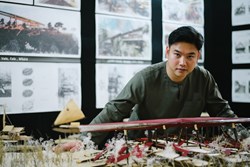A long rope ties me to home
This elegiac essay by Celia Mahon-Heap is about the changes seen in the Auckland neighbourhood of Westmere over the past 30 years.
The sound of the conch shell signalled that the games had begun. It filled the bay, echoing across the water at high tide. We would swim and sail against our neighbours, rowing old dinghies in between buoys until we were too tired to move. Back when the water was still swimmable and the house prices, just within reach. At the end of the day, everyone gathered together to share a pig, roasted over a large fire.
It's hard to imagine the Cox's Bay Regatta taking place today. Not just because of its environmental demise and muddy mangrove waters. Long gone are the men wearing lavalavas and women with flowers in their hair, the villas around Ponsonby and Grey Lynn now just a monotone series of glossy white fronts, and harsh black balustrades.
My parents lived in and around Ponsonby in central Auckland from the late 1970's -- houses were affordable and the community vibrant and diverse. We are who we are, largely in part to the people we love and the places we live. Our street in Cox's Bay was called Kotare Ave, 'kōtare' meaning kingfisher in Māori. A bird known for its silent swooping in on prey.
We lived in a modest Westmere bungalow, although one with stained glass church windows and a sail mast for a handrail. It was North facing with a large deck and its own little boat shed at the end of the backyard. Ridiculously lucky. My dad renovated it while I was in a backpack on his shoulders. I swung back and forth, my head rocking, as he used a hand saw to slice planks of wood. Flat builder's pencils in his large hands, or tucked behind his ear.
My dad ran a demolition company, which is funny for someone with the last name Heap. Sometimes paid in crates of beer, or crayfish that one time he accidentally let loose down our driveway, making us kids squeal in terror. He spent most of the 80's pulling down old churches and office blocks to make way for the construction boom of the time. Salvaging materials where he could, he'd sell them from what I remember as a large pit in the middle of the city.
Nearby, we attended All Saints Church, not because my parents were religious, but because my mum taught with the priest's wife. My first memory of boredom comes from sitting in class at Sunday School. The sermons were largely philosophical, and I'd get lost in the building's folding brick walls and dramatic roof structure.
Afterwards everyone would congregate under the deep porch, its design similar to a marae entrance. Today, the sign out front reads, 'All Saints Church, an inclusive faith community,' next to a proud rainbow.
Richard Toy, the building's architect, taught my Grandmother during her time at architecture school. She was one of the first women the school let in, and only because so many men had been away at war. One of the lecturers said to her; "you can be a woman, or an architect Dorothy, but not both."
I feel lucky to have lived one house down to my Grandmother, our properties connected by either the road or the bay. Going over to Doth's place was always soothing, her small unit exuding a sense of calm with its cane furniture and dream catchers, gently swinging in the wind.
When she thought she was dying, years before she actually did pass away, she started giving away her few possessions. A devout Buddhist, she believed holding onto material things caused suffering. For a while, a visit meant leaving with a family heirloom or obscure East Asian book.
One day between our little boat ramp and Doth's backyard, our neighbour returned from sea. He'd been fishing out in the Waitematā and came home with three sand sharks. They were bloody and hanging from posts on the jetty. Their teeth and open mouths still largely intact, poor creatures unnecessarily caught. Doth was angry at the man and I was scared.
Her balcony overlooked the water, where she would stand and wave to me as I sailed up and down the bay. My parents bought me a tiny blue sailboat when I was at primary school. Instead of having lessons, my dad tied me to the jetty with a long rope to make sure I didn't sail away. Eventually I was good enough to sail on my own without being attached to the shore.
I don't think I've ever experienced a feeling of complete freedom in the same way since. The harbour bridge became a sign to return back. In later years I've often thought about this, the rope attached to the end of that boat gave me the courage to venture out and brought me home, every time.
"Dig yourself to China", my dad said one day, a blurry memory I have as he stood next to the lemon tree, the sun so bright, it was hard to see, to make out his face. "It's a large place in-between the other side of the world and here. But for now, let's go down to the water".
So we went down to the water, as we always did, to float along the bay. "Beware of the caves", my dad said. Commanding the dingy as though it were a pirate ship and us, his comrades. "Rarrr beware of the caves!". Steering the boat deeper and darker into the damp overhangs of the pohutukawa trees, banging the boat into the side before rocking us back into the light.
"Dig yourself to China", and so I did. I followed my dad's words, got lost in the grit and glam of Shanghai where I saw out the last years of my 20s. Its foggy tree-lined streets and Sci-Fi looking cityscape kept me absorbed in a world of mystery. Only to return after years away to be locked down, back in sleepy Westmere, with a girl I hardly know. We spent the little freedom we had in our daily routine going for walks around the neighbourhood I grew up in. A Saturday evening in Level 4 consists of watching the sunset disappear over Te Tokaroa, Meola Reef, with black swans and health hazard warning signs. Seagulls circle outside our window and swoop up West End Road, towards new cafes. The diary owner recognises me and the typography on the buildings is largely untouched.
On a balmy and boring evening last summer, my girlfriend and I went to get Duck Island icecream. The queue wasn't too bad for once, and after selecting flavours like black sticky rice and orange blossom chocolate chip, I asked her, "do you want to go see a wall my parents built?". She was like, "uh, yeah sure." So we crossed over Ponsonby Road and walked down Collingwood Street, towards the lights. The city meeting us eye to eye from this proud perch.
Finally, we reached the old house, the one before Cox's Bay. "Here", I said, pointing at an eclectic brick wall, still standing 40 years later, the bricks likely saved from one of my dad's demolitions.
As I go for yet another walk around my old neighbourhood, there's no sound of a conch shell, no swimming in the bay. No house I can afford. I am reminded of hibiscus flowers, cabbage trees and my Grandmother. The smell of fresh seaweed takes me back to a world of boat races and pirates, and my childhood desire to both belong and be free.



